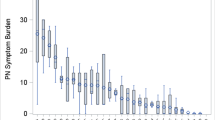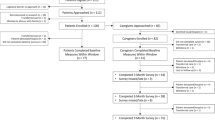Abstract
Prolonged periods of family caregiving can induce stress levels that may negatively influence caregiver health. However, the physiologic effect of psychological distress in oncology family caregivers has received little attention. Therefore we aimed to determine longitudinal profiles of inflammatory cytokines (IL-6 and IL-1ra) in neuro-oncology caregivers and identify associations between psychological distress and cytokine levels. Depressive symptoms, anxiety, caregiver burden and blood were collected from 108 adult caregivers at adult patients’ diagnosis, 4-, 8-, and 12-months. Trajectory analyses of log transformed cytokine levels were performed. Multiple logistic regression analyses evaluated the impact of psychological distress on cytokine levels. For both cytokines, two distinct populations were identified, neither of which changed over time. High IL-1ra was associated with male caregivers with anxiety (OR = 1.7; 95 %CI 1.06–2.83) and obese caregivers (BMI = 40) who felt burdened due to disrupted schedules (OR = 1.3; 95 %CI 1.02–1.77). Conversely, caregivers with a healthy weight (BMI = 25) who felt burdened due to disrupted schedules were less likely to have high IL-1ra (OR = 0.71; 95 %CI 0.54–0.92). Caregivers ≤30 years old with lower self-esteem from caregiving were 1.16 times (95 %CI 1.04–1.30) more likely to have high IL-6. Analysis demonstrated groups of family caregivers with high and low levels of systemic inflammation and these levels did not change longitudinally over the care trajectory. Poor physical health in family caregivers may have a negative impact on the burden placed on the healthcare system in general and on the well-being of neuro-oncology patients in particular.



Similar content being viewed by others
References
Coughlin J (2011) Estimating the impact of caregiving and employment on well-being. Outcomes Insights Health Manag 2:1–7
Schulz R, Beach S (1999) Caregiving as a risk factor for mortality: the Caregiver health effects study. J Am Med Assoc 282:2215–2219
Fredman L, Cauley J, Hochberg M, Ensrud K, Doros G (2010) Mortality associated with caregiving, general stress, and caregiving-related stress in elderly women: results of caregiver-study of osteoporotic fractures. J Am Geriatr Soc 58:937–943
Brown S, Smith D, Schulz R, Kabeto M, Ubel P, Poulin M, Yin J, Kim C, Lange K (2009) Caregiving behavior is associated with decreased mortality risk. Psychol Sci 20:488–494
Gouin J, Hantsoo L, Kiecolt-Glaser J (2008) Immune dysregulation and chronic stress among older adults: a review. NeuroImmunoModulation 15:251–259
Gouin J, Glaser R, Malarkey W, Beversdorf D, Kiecolt-Glaser J (2012) Chronic stress, daily stressors, and circulating inflammatory markers. Health Psychol 31:264–268
Roepke S, Chattillion E, von Kanel R, Allison M, Ziegler M, Dimsdale J, Mills P, Patterson T, Ancoli-Israel S, Calleran S, Harmell A, Grant I (2011) Carotid plaque in Alzheimer caregivers and the role of sympathoadrenal arousal. Psychosom Med 73:206–213
von Kanel R, Mausbach B, Patterson T, Dimsdale J, Aschbacher K, Mills P, Ziegler M, Ancoli-Israel S, Grant I (2008) Increased Framingham Coronary Heart Disease Score in dementia caregivers relative to non-caregiving controls. Gerontology 54:131–137
Pinquart M, Sorensen S (2007) Correlates of physical health of informal caregivers: a meta-analysis. J Gerontol B Psychol Sci Soc Sci 62:126–137
Kiecolt-Glaser J, Glaser R, Shuttleworth E, Dyer C, Ogrocki P, Speicher C (1987) Chronic stress and immunity in family caregivres of Alzheimer’s disease victims. Psychosom Med 49:523–535
von Kanel R, Dimsdale J, Ancoli-Israel S, Mills P, Patterson T, McKibbin C, Archuleta C, Grant I (2006) Poor sleep is associated with higher plasma proinflammatory cytokine interleukin-6 and procoagulant marker fibrin D-dimer in older caregivers of people with Alzheimer’s disease. J Am Geriatr Soc 54:431–437
Maes M et al (1995) Increased serum interleukin-1 receptor antagonist concentrations in major depression. J Affect Disord 36(1–2):29–36
Alesci S et al (2005) Major depression is associated with significant diurnal elevations in plasma interleukin-6 levels, a shift of its circadian rhythm, and loss of physiological complexity in its secretion. J Clin Endocrinol Metab 90(5):2522–2530
Kiecolt-Glaser JK et al (1996) Chronic stress alters the immune response to influenza virus vaccine in older adults. Proc Natl Acad Sci USA 93(7):3043–3047
Mills PJ et al (1997) Plasma catecholamine and lymphocyte beta 2-adrenergic receptor alterations in elderly Alzheimer caregivers under stress. Psychosom Med 59(3):251–256
Kiecolt-Glaser JK, Glaser R (1995) Psychological stress and wound healing. Adv Mind-Body Med 17(1):15–16
Kiecolt-Glaser JK et al (2003) Chronic stress and age-related increases in the proinflammatory cytokine IL-6. Proc Natl Acad Sci USA 100(15):9090–9095
Lutgendorf SK et al (1999) Life stress, mood disturbance, and elevated interleukin-6 in healthy older women. J Gerontol Ser A: Biol Sci Med Sci 54(9):M434–M439
Lengacher C, Kip K, Barta M, Post-White J, Jacobsen P, Groer M, Lehman B, Moscoso M, Kadel R, Le N, Loftus L, Stevens C, Malafa M, Shelton M (2012) A pilot study evaluating the effect of mindfulness-based stress reduction on psychological status, physical status, salivary cortisol, and interleukin-6 among advanced-stage cancer patients and their caregivers. J Holist Nurs 30:170–185
Dunn L, Aouizerat B, Langford D, Cooper B, Dhruva A, Cataldo J, Baggott C, Merriman J, Dodd M, West C, Paul S, Miaskowski C (2013) Cytokine gene variation is associated with depressive symptom trajectories in oncology patients and family caregivers. Eur J Oncol Nurs 17:346–353
Miller G, Murphy M, Cashman R, Ma R, Ma J, Arevalo J, Kobor M, Cole S (2014) Greater inflammatory activity and blunted glucocorticoid signaling in monocytes of chronically stressed caregivers. Brain Behav Immun 41:191–199
Radloff L (1977) The CES-D scale: a self-report depression scale for research in the general population. Appl Psychol Meas 1:385–401
Andresen E, Malmgren J, Carter W, Patrick D (1994) Screening for depression in well older adults: evaluation of a short form of the CES-D (Center for Epidemiologic Studies Depression Scale). Am J Prev Med 10:77–84
Usala P, Hertzog C (1989) Measurement of affective states in adult: evaluation of an adjective rating scale instrument. Res Aging 11:403–426
Given C, Given B, Stommel M, Collins C, King S, Franklin S (1992) The caregiver reaction assessment (CRA) for caregivers to persons with chronic physical and mental impairments. Res Nurs Health 15:271–283
Stommel M, Wang S, Given C, Given B (1992) Confirmatory factor analysis (CFA) as a method to assess measurement equivalence. Res Nurs Health 15:399–405
Milaneschi Y, Corsi A, Penninx B, Guralnik J, Ferrucci L (2009) Interleukin-1 receptor antagonist and incident depressive symptoms over 6 years in older persons: the InCHIANTI study. Biol Psychiatry 65:973–978
Arend W (2002) The balance between IL-1 and IL-1Ra in disease. Cytokine Growth Factor Rev 13:323–340
Schwarz G (1978) Estimating the dimension of a model. Ann Stat 6:461–464
Miller A, Ancoli-Israel S, Bower J, Capuron L, Irwin M (2008) Neuroendocrine-immune mechanisms of behavioral comorbidities in patients with cancer. J Clin Oncol 26:971–982
Kiecolt-Glaser J, Gouin J, Hantsoo L (2010) Close relationships, inflammation, and health. Neurosci Biobehav Rev 35:33–38
Eccles R (2005) Understanding the symptoms of the common cold and influenza. Lancet Infect Dis 5:718–725
O’Connor M, Bower J, Cho H, Creswell J, Dimitrov S, Hamby M, Hoyt M, Martin J, Robles T, Sloan E, Thmas K, Irwin M (2009) To assess, to control, to exclude: effects of biobehavioral factors on circulating inflammatory markers. Brain Behav Immun 23:887–897
Initiative, NHLBI Obesity Education (2010) Obesity education initiative: clinical guidelines on the identification, evaluation, and treatment of overweight and obesity in adults. http://webarchive.library.unt.edu/eot2008/20080916210618/http://hp2010.nhlbihin.net/oei_ss/download/pdf/CORESET1.pdf. Accessed 21 Oct 2015
Moore R, Chattillion E, Ceglowski J, Ho J, von Kanel R, Mills P, Ziegler M, Patterson T, Grant I, Mausbach B (2013) A randomized clinical trial of Behavioral Activation (BA) therapy for improving psychological and physical health in dementia caregivers: results of the Pleasant Events Program (PEP). Behav Res Ther 51:623–632
Choi C, Stone R, Kim K, Ren D, Schulz R, Given C, Given B, Sherwood P (2012) Group-based trajectory modeling of caregiver psychological distress over time. Ann Behav Med 44:73–84
Meier C, Bobbioni E, Gabay C, Assimacopoulos-Jeanet J, Golay A, Dayer J (2002) IL-1 receptor antagonist serum levels are increased in human obesity: a possible link to the resistance to leptin? J Clin Endocrinol Metab 87:1184–1188
Carstensen M, Herder C, Kivimaki M, Jokela M, Roden M, Shipley M, Witte D, Brunner E, Tabak A (2010) Accelerated increase in serum interleukin-1 receptor antagonist starts 6 years before diagnosis of type 2 diabetes: whitehall II prospective cohort study. Diabetes 59:1222–1227
Maes M, Lin A, Delmeire L, van Gastel A, Kenis G, de Jongh R, Bosmans E (1999) Elevated serum interleukin-6 (IL6) and IL-6 receptor concentrations in posttraumatic stress disorder following accidental man-made traumatic events. Biol Psychiatr 45:833–839
Stone S, Price P, Keane N, Murray R, French M (2002) Levels of IL-6 and soluble IL-6 receptor are increased in HIV patients with a history of immune restoration disease after HAART. HIV Med 3:21–27
Robak T, Gladalska A, Stepien H, Robak R (1998) Serum levels of interleukin-6 type cytokines and soluble interleukin-6 receptor in patients with rheumatoid arthritis. Mediat Inflamm 7:347–353
Ridker P, Rifai N, Stampfer M, Hennekens C (2000) Plasma concentration of interleukin-6 and the risk of future myocardial infarction among apparently healthy men. Circulation 101:1767–1772
Steptoe A, Hamer M, Chida Y (2007) The effects of acute psychological stress on circulating inflammatory factors in humans: a review and meta-analysis. Brain Behav Immun 21:901–912
Bessler H, Osovsky M, Beilin B, Alcalay Y, Sirota L (2007) The existence of gender difference in IL-1 Ra gene polymorphism. J Interferon Cytokine Res 27:931–935
Waschul B, Herforth A, Stiller-Winkler R, Idel H, Granrath N, Deinzer R (2003) Effects of plaque, psychological stress and gender on crevicular Il-1 beta and Il-1ra secretion. J Clin Periodontol 30:238–248
Elangovan S, Brogden K, Dawson D, Blanchette D, Pagan-Rivera K, Stanford C, Johnson G, Recker E, Bowers R, Haynes W, Avila-Ortiz G (2014) Body fat indices and biomarkers of inflammation: a cross-sectional study with implications for obesity and peri-implant oral health. Int J Oral Maxillofac Implants 29:1429–1434
Milaneschi Y, Corsi A, Penninx B, Bandinelli S, Guralnik J, Ferrucci L (2009) Interleukin-1 receptor antagonist and incident depressive symptoms over 6 years in older persons: the InCHIANTI study. Biol Psychiatr 65:973–978
von Kanel R, Dimsdale J, Mills P, Ancoli-Israel S, Patterson T, Mausbach B, Grant I (2006) Effect of Alzheimer caregiving stress and age on frailty markers interleukin-6, C-reactive protein, and D-dimer. J Gerontol B Psychol Sci Soc Sci 61:963–969
Jehn C, Kuehnhardt D, Bartholomae A, Pfeiffer S, Krebs M, Regierer A, Schmid P, Possinger K, Flath B (2006) Biomarkers of depression in cancer patients. Cancer 107:2723–2729
von Kanel R, Mausbach B, Mills P, Dimsdale J, Patterson T, Ancoli-Israel S, Ziegler M, Allison M, Chattillion E, Grant I (2013) Longitudinal relationship of low leisure satisfaction but not depressive symptoms with systemic low-grade inflammation in dementia caregivers. J Gerontol B Psychol Sci Soc Sci, p gbt020
Clark M, Nicholas J, Wassira L, Gutierrez A (2013) Psychosocial and biological indicators of depression in the caregiving population. Biol Res Nurs 15:112–121
Sherwood P, Given C, Given B, von Eye A (2005) Caregiver burden and depressive symptoms: analysis of common outcomes in caregivers of elderly patients. J Aging Health 17:125–147
McInnis C, Thoma M, Gianferante D, Hanlin L, Chen X, Breines J, Hong S, Rohleder N (2014) Measures of adiposity predict interleukin-6 responses to repeated psychosocial stress. Brain Behav Immun 42:33–40
Mausbach B, von Kanel R, Roepke S, Moore R, Patterson T, Mills P, Dimsdale J, Ziegler M, Ancoli-Israel S, Allison M, Grant I (2011) Self-efficacy buffers the relationship between dementia caregiving stress and circulating concentrations of the proinflammatory cytokine interleukin-6. Am J Geriatr Psychiatr 19:64–71
Funding
National Institutes of Health, National Cancer Institute (R01CA117811).
Author information
Authors and Affiliations
Corresponding author
Ethics declarations
Conflict of interest
No conflict of interest exists for any author.
Rights and permissions
About this article
Cite this article
Sherwood, P.R., Price, T.J., Weimer, J. et al. Neuro-oncology family caregivers are at risk for systemic inflammation. J Neurooncol 128, 109–118 (2016). https://doi.org/10.1007/s11060-016-2083-3
Received:
Accepted:
Published:
Issue Date:
DOI: https://doi.org/10.1007/s11060-016-2083-3




